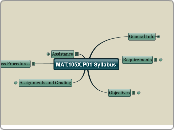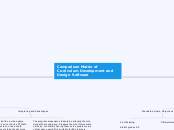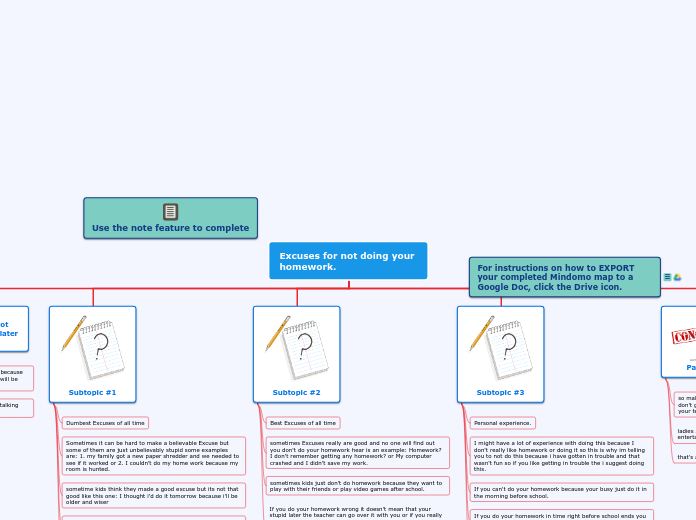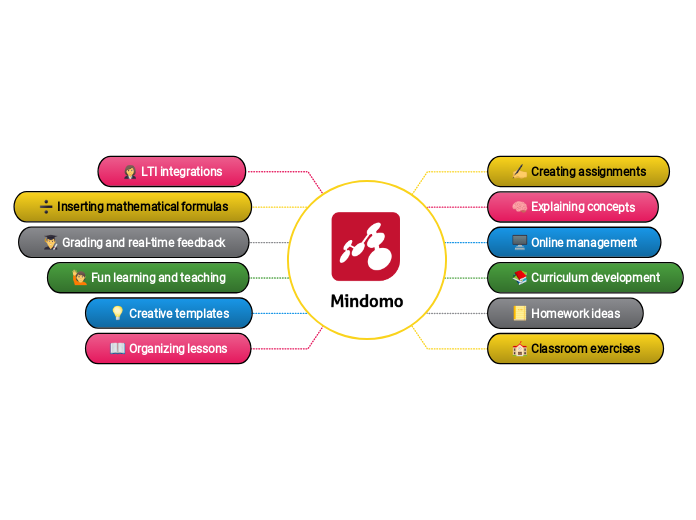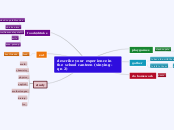MAT.105X.P01 Syllabus
Assignments and Grading
Homework
Suggested Homework
Each chapter has a list of suggested homework. You are expected to practice the math you are learning on your own. I suggest you do the following to maximize learning.
Read the section in the textbook first. Pay close attention to new vocabulary, concepts, formulas, etc.Have pencil and paper ready and try the examples in the textbook on your own.Review your notes.Don’t be afraid to look for videos online. I will try to make some available through Moodle as appropriate.Use any handouts you’ve received, look at any other materials made available to you through Moodle, and don’t be afraid to use the calculator to help in appropriate ways.Work on the suggested homework problems in a deliberate and methodical way, making sure you understand each step. Remember, you won’t have access to your book or your notes during tests.Ask questions when you get stuck. You can talk to me in person, email me, use the Math Lab, or post online.Procedure / Guidelines
Technology
If you are interested in using technology, Microsoft Word has a built-in Equation Editor (see the Microsoft Office website for help if you need it), and Texas Instruments offers free TI-Connect software that allows you to download screen captures from your calculator (if you have a TI-83 series calculator, you will need to purchase a Silver USB cable to connect the port that looks like a headphone jack on your calculator to a USB port on your computer; the TI-84 series calculators should come with a cable for connecting their mini-USB port to a USB port on your computer). The Internet has lots of additional software solutions as well.
TI Silver USB Cable
Microsoft Office
TI-Connect
Grading
Expect that your homework will be graded about 75% on mathematical content and accuracy, and about 25% on presentation and adherence to the criteria above. Extra credit may be awarded for exceptional presentations, including the appropriate use of technology. Even if you use technology to put together your homework, I would like a printed copy turned in for grading.
Criteria
Your homework will be graded based on the following criteria.
The original problem is included, in its entirety, including any graphs, diagrams, and/or tables.
Your work is clearly shown in a methodical step-by-step fashion.
Your work is explained in short, clear English statements.
Your answer is clearly stated in the context of the problem. This should be a complete and proper English sentence.
See the examples in your textbook for a good idea of what is expected. Think of presenting each problem as a short report.
Additionally, please pay attention to the following guidelines when working on your hand-in homework.
If your assignment includes multiple problems, when you finish working on one problem, please begin the next problem on a brand new clean sheet of paper.
Your homework should be neat, legible, and organized.
Please staple, paperclip, or binderclip your homework.
Homework should not have any uneven edges from spiral-bound notebooks.
Overview
Your hand-in homework assignments will not be particularly long in nature. They will typically consist of a few application/story problems. In addition to getting practice with application/story problems, a secondary purpose for having you turn in homework is to have you work on your communication and presentation skills.
Late Policy
Homework is due at the beginning of class. Any homework turned in after the instructor collects it is late. Late homework will be penalized 20% of the possible points for each class period it is late. Homework that is not turned in will initially receive a zero, but that score will be replaced once the homework has been turned in, assuming it has a final score greater than zero. Please note that homework can always be turned in early, but there are no exceptions to the late penalty.
Quizzes
Quizzes begin and end at the same time for all students regardless of student circumstances. Typically, quizzes will not be announced in advance. There are no quiz makeups or retakes and quizzes cannot be taken early. Therefore, it is important to attend class regularly and for the full period.
Tests
Missed tests are given a zero. You may make up one missed test. Test makeups will occur at the end of the semester. Makeup tests will be similar to, but not the same as, the original test given in class. Under certain circumstances, tests can be taken early. Please talk to your instructor if you need to take a test early. There are no test retakes – once you begin a test, you must complete it and you will not have an opportunity to take it again.
Grading Scale
The following scale will be used to assign letter grades at the end of the semester based on the total number of points you earn. There are ~628 points possible. In the event the total number of points differs from 628, the percent scale will be used to determine final grades.
Points Percent Grade
616 or more 93% or higher A
596-615 90-92.9% A-
576-595 87-89.9% B+
550-575 83-86.9% B
530-549 80-82.9% B-
510-539 77-79.9% C+
483-509 73-76.9% C
464-482 70-72.9% C-
444-463 67-69.9% D+
417-443 63-66.9% D
397-416 60-62.9% D-
0-396 0-59.9% F
Overview of Assignments
You will be expected to complete the following assignments:
Tests: 5 @ 100 pts ea = 500 points
Quizzes: ~10 @ 10 pts ea (drop the 2 lowest) = ~80 pointsHand-in HW: 5 @ 12 pts ea (drop the 1 lowest) = 48 pointsThe PreTest counts as up to 10 extra credit pointsThe PostTest counts as up to 10 extra credit pointsAcademic Dishonesty
Instructor Policy
Instructor Policy on Academic Dishonesty and Plagiarism
In this course, academic dishonesty will not be tolerated.
First offense is a zero on that assignment.Second offense is a zero for the course.Offenses include, but are not limited to:
Presenting other students' work as your own. This includes copying from another student.Using any testing aids that have not been approved by the instructor.Sharing calculators during quizzes and tests.Accessing a mobile phone for any reason during a quiz or test.MMCC Policy
MMCC Policy on Academic Dishonesty and Plagiarism
Academic Dishonesty: No student shall:
Share or obtain exam questions or material not authorized by the instructor.Complete exams or performance elements of a course for another student or have someone else complete it for them.Plagiarism: Plagiarism is using another’s ideas as one’s own. Plagiarism has two forms, unintentional and intentional. Unintentional plagiarism is usually the result of students being unfamiliar with the academic conventions of citation and documentation. Intentional plagiarism is the result of students knowingly submitting the work of others as their own. This includes, but is not limited to:
Copying someone else’s work.Using exact quotations without proper citation.Buying papers (e.g. on the internet).Including paraphrased material without acknowledging its source.All acts of plagiarism and academic dishonesty will first be dealt with by the instructor. Penalties may range from revision to failing the assignment or the course. Instructors must report all acts of intentional dishonesty or plagiarism, or any penalty resulting in failure of the course, to the Vice President of Academic Services and the Dean of Student Services. Repeated violations may result in further discipline, up to and including dismissal. Students may appeal any grade affected by a charge of academic dishonesty or plagiarism through the Grade Grievance Procedure.
Class Procedures
Please bring any concerns about the classroom environment to your instructor before, after, or outside of class.
Between Classes
Plan on spending 3 hours:
Rereading material in the textbook.
Making sure your notes are complete and accurate.
Working on both suggested and hand-in homework problems (see Homework Procedure and Suggested Homework).
Scanning any new material for the next class meeting.
Phones
Turn off all mobile phones (and other non-calculator devices) – this does not mean put them on quiet mode, it means turn them off.
If you use your phone in any way during a quiz or a test, you will receive a zero on the quiz or test, and you may receive an “F” for the course. (See Academic Dishonesty.)
Ask Questions!
During class, direct questions to your instructor, not your neighbor.
Raise your hand or politely interrupt the instructor.
While it is usually best to ask questions during class when they are most relevant to you, you are welcome to ask them outside of class as well.
In Class
Be ready to learn while in class – come with a good attitude, the textbook, note and graph paper, a calculator, pencils, and a good eraser.
Pay attention, take notes, and participate.
Be respectful of your classmates.
Do not converse with your neighbor.
Do not work on homework for this or other classes.
Turn off all mobile phones (and other non-calculator devices) – this does not mean put them on quiet mode, it means turn them off.
Please do not bring food to class. Beverages are acceptable if they are in resealable containers.
Attending (and not)
Make your best effort to attend every class. Your attendance will be reported to MMCC as required for determining financial aid eligibility.
If you are late to class, please come in and quietly take a seat.
If you need to leave during class, do so quietly.Meet some of your fellow students. You may be able to study with them or just copy their notes if you miss class.If you miss class, get the notes from a neighbor and check out the supplemental materials available on Moodle.
Check Moodle for course announcements, especially in the event of any class cancellations.
Assistance
Please contact me with any questions you may have about the course and its content. I am available during office hours (and at other times by appointment), via email, as well as through the Moodle course shell.
I also encourage you to make use of the Math Lab, available in the ASC (and directly outside my office). Their hours of operation are posted in the ASC. You can also find out more about the Math Lab by following the Academic Support Center link on the left-hand side of the course under MMCC Resources in Moodle, as well as by reading the Math Lab section near the end of this syllabus.
Tips for Success
There are many, many tips for how to do well in a math course. Here are a few.
If you are interested in more, look in your textbook, look on Educator, communicate with your instructor, search on the Internet, etc.
Set aside plenty of time each week for your math courseDon't fall behindRead the textbook, even if you don't understand everything, so you've seen the material once before the video lectureWrite down questions you have while working alone and make sure you get them answeredTake good notes, then reread and rewrite your notes laterBuild a toolbox of terms, principles, concepts, and theoriesWork example problems on your own, paying close attention to what happens at each stepDo the suggested homework problems (and more if needed)Ask questionsPractice, practice, practice!Math Study Skills
If you feel you need assistance with your Math Study Skills, please talk to your instructor.
There is also a course available, MAT 060 Math Study Skills. It's a 1.5 contact hour pass/fail course that looks in some detail at how to get the most out of a math course by improving their skills with
textbook reading,note taking,homework,effective studying, andtest taking.Reading / Writing Center
The Writing & Reading Center at MMCC exists to help students become better writers and readers. The WRC is a comfortable environment where students receive individualized consultation to reach the ultimate goal of developing intellectual autonomy and constructive writing and reading habits. To this end, the WRC is not merely a proofreading service; consultants are available to assist students with their writing needs in any course, and at any stage of the writing process, including planning, focusing, developing, organizing, critical thinking, engaging sources in multiple ways, and editing. In addition, because of the symbiotic nature of reading and writing, WRC consultants can also assist students with their college-level reading needs for any course. ENG 098, a one credit reading course, is offered through the WRC. This student-centered, student-directed reading course gives students a chance to learn about and develop the strategies, skills, and attitudes important for reading college-level texts. The WRC is located in the Academic Support Center in Room 136 on the Mt. Pleasant Campus and in Room 219 on the Harrison Campus. In addition, students may opt to use the WRC Moodle or e-mail writing questions with or without writing drafts to a Consultant at write@midmich.edu.
Accommodations
Any student who feels they may need an accommodation based on the impact of a disability should contact the instructor as soon as possible to discuss your individual needs. Before any accommodation is granted, you must register with Carol Santini, Director of Disability Services for MMCC. She can be reached at 989.386.6636 or at csantini@midmich.edu. More information is available via Disability Services.
Math Lab
The Math Lab provides drop-in assistance with math problems from any course, not just math courses. You will find the Math Lab in the Academic Support Center in room 219 on the Harrison campus and room 135 on the Pickard campus. Please call ahead to check hours of operation.
We ask that you do the following before coming to the Math Lab for assistance:
attend class,read the textbook,review your notes,attempt the homework problems yourself,write down your questions before coming to the Math Lab, andbring a copy of your assignment and your textbook when you come to the Math Lab.Math Lab tutors will:
help you as soon as they can for as long as they are able,answer your questions or direct you to where you can obtain answers,assist you in clarifying information,show you problem-solving methods, andwork through example problems with you.Math Lab tutors will not:
substitute as a lecturer for classes you missed,always have the answer to every question, ordo your work for you.Instructor
Room 214, Mt. Pleasant Pickard Campus
Office Hours: TTH 11:30am to 12:30pm
Objectives
More detailed explanations of these objectives, which align with the chapters covered in the textbook, can be found in Moodle.
Graphically determine the solution sets for systems of linear inequalities.
Solve absolute value equations and inequations.
Simplify rational expressions, add/subtract/multiply/divide rational expressions, solve rational equations, and solve application problems using rational equations.
Be able to use your Basic Algebra skills as needed to solve algebra problems.
Requirements
Calculator
Calculator: A TI-83 Plus, TI-84 Plus, or TI-nSpire graphing calculator.
I personally recommend the TI-84 Plus or the TI-nSpire. If you choose to purchase a TI-nSpire, make sure you get the one with the TI-83/84 keypad so you can follow the calculator help in the course.You must contact the instructor if you have a calculator other than one of the models listed above. Certain calculators, most notably the TI-89 and TI-92, are not allowed. Others may not have the functionality you need for the course. If you choose to use a different calculator, you will be responsible for learning how to operate it -- all course material is specifically geared toward the TI-83/84 family of calculators.It is expected that you will spend time with the calculator on your own to learn some of its functionality, especially basic functions. You should have received documentation with the calculator and there are numerous online resources for many brands and models to assist you.You must have your own calculator. Calculators cannot be shared on quizzes and tests. Cell phones, iPods, and similar devices may not be used as calculators for testing purposes (see more about cell phones and other devices under Class Procedures and Academic Dishonesty.)
Supplies
Notepaper
Graph paper
Pencils
Erasers
Straight edge
Stapler or paperclips
Textbook
Applied Beginning and Intermediate Algebra
2nd edition
Sherri Messersmith
Course Prerequisite
A grade of “C” or better in MAT 104 Basic Algebra; or equivalent.
General Info
Some Important Dates
Friday, August 27 -- Last day to drop with a 100% refund
Monday, September 6 -- No Classes: Labor Day
Sunday, September 19 -- MMCC Fall Festival
Wednesday, November 24 -- No Classes: In-Service Day
Thursday, November 25 -- No Classes: Thanksgiving
Friday, December 3 -- Last day to drop classes
Friday, December 10 -- Last day of fall semester
Drops
If you stop participating in this class without dropping, you will receive an ‘F’.
Course Purpose
MAT 105 Intermediate Algebra is a required course for the Associate in Arts Degree, as well as degrees in Criminal Justice – Corrections, Criminal Justice – Law Enforcement (4 yr. Transfer Program), Criminal Justice – Law Enforcement Pre-Service, Elementary Education – CMU, and Secondary Education – CMU. It is also a prerequisite for other courses, including: CHM 111, IND 116, MAT 116, MAT 118, and MAT 124. The content is meant to strengthen and extend students' algebra and problem solving skills.
MMCC Common Goals
The faculty at MMCC has identified three broad academic goals for all students:
We expect students to be able to THINK critically about subject matter.We expect students to be able to DO various tasks as a result of their studies.We expect students to be able to SHARE their thoughts and work appropriately with others.This course meets the above stated goals as follows:
Students must THINK to recognize problem types and choose appropriate solution methods, to convert application problems into mathematical problems, and to determine if their solution 'makes sense'.Students must DO problems using the solution methods they are shown correctly and in the right situation(s).Students must SHARE what they have done by writing out solution steps, making sure enough steps are present for others (instructor, fellow students, et al.) to follow, clearly communicating their final solution(s), and completely and appropriately communicating their results to application problems.Catalog Description
MAT 105X and MAT 105Y are a two semester sequence covering the same material as the traditional classroom version of MAT 105. MAT 105X includes a brief review of basic algebra before covering functions, function operations, functions of variation, and systems of linear equations in two and three variables. MAT 105Y includes inequalities, absolute value equations and inequalities, radicals and rational exponents, rational equations, and quadratic equations, functions, and graphs. Note: Students choosing to take MAT 105 as a sequence must complete either the ABC sequence or the XY sequence to complete MAT 105. Courses from the two sequences cannot be mixed. Prerequisite: Grade of “C” or better in MAT 104 or equivalent to take MAT 105X. Must have a “C” or better in MAT 105X to take MAT 105Y.
From MAT 105 Course Description: A continuation of Basic Algebra including an in-depth study of some of the topics covered in MAT 104. Topics include polynomials, rational expressions and equations, radicals, integer and rational exponents, equations of the line, quadratic equations, functions, linear systems, and Cramer’s Rule.
Instructor Info
David Kedrowski
Room 214, Mt. Pleasant Pickard Campus
Office Hours: TTH 11:30am to 12:30pm or by appt.
dkedrowski@midmich.edu
Course Info
Intermediate Algebra, Part 1
MAT.105X.P01 (37974)
Tuesdays and Thursdays, 10:00am to 11:20am
Room 112, Mt. Pleasant Pickard Campus
